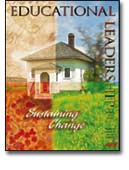Change Is Good
At www.ncrel.org/sdrs/areas/issues/educatrs/profdevl/pd2syst.htm, an outline for a workshop on understanding systemic change directs participants to watch barn-raising scenes from the film Witness. In this thriller, an undercover police agent becomes part of an Amish community. Intended to help participants define what makes a system and what doesn't, the activity is part of "The Toolkit for Professional Developers" developed by the North Central Regional Educational Laboratory. Check out "Leadership for Learning" for helpful articles.
Can we mandate what matters? Not according to change expert Michael Fullan. At this site sponsored by the Center for Development and Learning (www.cdl.org/making_change.html), Fullan outlines basic lessons on the complexity of change and notes that the more complex the change, the less we can force it. Fullan also presents "interlocking recommendations" about what matters most and assumptions about change, such as, "We should assume that changing the culture of institutions is the real agenda, not implementing single innovations."
"Beware the Shallow Waters! The Dangers of Ignoring History and the Research on Change in Schools" is just one of several articles in The Educational Technology Journal's theme issues on change (www.fno.org). Click "change" in the homepage index to find helpful guidance from Michael Fullan, Larry Cuban, Ellen Mandinach, Steven Hodas, and Henry Becker. The site invites readers to forward any article to "anyone you think might enjoy it."
Transformation and Frameworks
Teaching the Caterpillar to Fly an entertaining presentation on managing change (www.squarewheels.com/content/teaching.html), begins with a short, short story: "Two caterpillars are conversing and a beautiful butterfly floats by. One caterpillar turns and says to the other, You'll never get me up on one of those butterfly things.'" Author Scott J. Simmerman makes a convincing case for how unproductive it is to think we know "the answer" to making performance improvement. Along with fascinating facts about on caterpillars, moths, and butterflies, this site links to Simmerman's training program on managing roadblocks to change.
"It's OK, and necessary, for educators to make a mistake, take a risk, take a chance." This is one finding of a research project on school change in 12 high-performing Ohio schools (http://tlc.treca.org). The Ontario Institute for Studies in Education asked this question: "How do learning communities in schools develop?" Findings analyze which strategies produce the greatest degree of school change and the depth and effect of school change on students, teachers, and schools as a whole. This site includes short video clips.
What is the difference between strategic planning and visioning? What should we expect as a result of visioning? Although primarily aimed at business and trade associations, some resources on this site from Smith, Bucklin & Associates (www.sba.com/home.cfm) are great for education leaders. Click "Resources" for a "Framework for Conducting a Visioning Meeting," which shows how to develop a vision for an organization.
Leaders and Innovators
"Successful change leaders understand—and are adept at leading others to understand—how to envision change, how to create the infrastructure for change, and how to drive change every day," states Phil Schlechty in this resource from the Center for Leadership in School Reform (www.clsr.org/home/leading.htm). Schlechty outlines three major capacities that school leaders must develop to support effective improvements. He also proposes 10 standards that facilitate and sustain systemic change.
A free, online magazine from the Eisenhower National Clearinghouse for Science and Mathematics Education, ENC Focus: A Magazine for Classroom Innovators(http://change.enc.org/focus/topics/change/index.htm) dedicated its January 2000 issue to the "Reality of Change." The "Resources" section includes articles from teachers at various grade levels, who describe their experiences in "Surviving School Reform."
Recognizing that "family involvement in children's education yields high returns," the Harvard Family Research Project (http://gseweb.harvard.edu/~hfrp/family-school) supports efforts to achieve sustainable, high-quality programs. Click "Solutions for Sustaining Partnerships" for strategic approaches.
At www.ascd.org, ASCD members have a wealth of online resources, such as full-text articles from Educational Leadership, lengthy excerpts from ASCD books, an online resource catalog, and online conference programs and institute listings. For example, check out the study guide for the bestselling book Building Leadership Capacity in Schools by Linda Lambert. From the homepage, go to "Reading Room," then to "Browse ASCD Books," then to "ASCD Study Guides."
